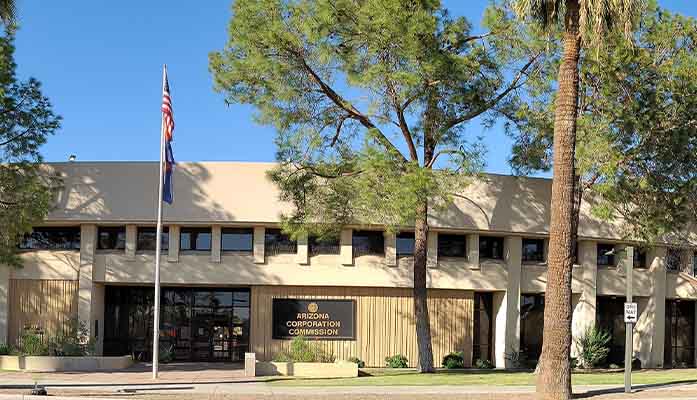
by Ethan Faverino | Oct 21, 2025 | News
By Ethan Faverino |
Congressman Juan Ciscomani (R-AZ06) announced last week that his re-election campaign has entered the final quarter of 2025 with a daunting $2.3 million cash on hand, signaling strong momentum as he seeks a third term.
“I’m incredibly grateful for the outpouring of support from Arizonans who believe in our mission to deliver results, not rhetoric,” said Congressman Ciscomani. “With more than $2.3 million cash on hand, it sends a clear message: Southern Arizona is fired up to keep this seat red and focused on commonsense solutions. While others are busy playing politics, we’re building momentum, delivering wins, and earning the trust of the people we serve.”
The campaign’s financial strength follows a strong third quarter, with Ciscomani raising over $600,000 in Q3 alone.
To date, the campaign has raised nearly $3 million for the 2026 cycle, significantly surpassing its 2024 cycle performance when Ciscomani had $1.8 million cash on hand and $2.25 million raised at a similar point.
The growing campaign funds show deep and expanding support for Ciscomani across Arizona’s 6th Congressional District, which spans portions of five different counties.
Ciscomani has won back-to-back victories in the highly competitive district. In 2022, he flipped the seat by a narrow 1.4% margin (5,232 votes), and in 2024, he expanded his lead, securing re-election by 2.5% (over 10,800 votes).
Ciscomani serves on the House Appropriations and Veterans’ Affairs Committees and was named the most effective member of Arizona’s congressional delegation in the 118th Congress earlier this year by the nonpartisan Center for Effective Lawmaking.
His commitment to addressing key issues—such as economic opportunity, veterans’ services, and border security— has solidified his reputation as a pragmatic leader delivering for Southern Arizona.
Ethan Faverino is a reporter for AZ Free News. You can send him news tips using this link.

by Ethan Faverino | Oct 21, 2025 | Education, News
By Ethan Faverino |
A new study has revealed that Arizona has one of the lowest college graduation rates in the nation at 49.58%.
Ranking eighth worst in the U.S., Arizona’s graduation rate falls 11.34% below the national average of 60.92%, according to the latest data from the U.S. Department of Education’s National Center for Education Statistics.
The study, conducted by Hennessey Digital, analyzed graduation rates across all colleges in each state, highlighting a troubling trend for Arizona, where only 49.58% of the students in the cohort completed their degrees within 150% of the normal program completion time (4 years).
This places Arizona alongside other struggling states, making it one of the eight states below 50% graduation.
“Regardless of what you’re studying, college can be a challenging time, said CEO of Hennessey Digital, Jason Hennessey. “For many, it’s the first experience of independence, a change from the environment you’ve grown up in and ultimately, incredibly intense. It’s not surprising to see that many drop out of their courses before graduation, but ultimately, every student needs to consider what’s going to make them happy and successful and an academic path is not always going to achieve that.”
The research identifies Alaska as the state with the lowest college graduation rate at 32.93%, a staggering 27.99% below the national average. Only 735 of 2,232 students in Alaska’s cohort completed their degrees.
Following closely are Nevada, with 45.20% completion, with 4,932 out of 10,912 students graduating, and New Mexico, with 47.80% completion and 3,523 out of 7,370 students graduating. Both are struggling with significant gaps in degree completion compared to the national average.
In contrast, Massachusetts leads the nation with a 75.41% graduation rate, 14.49% above the national average, with 40,011 out of 53,060 students completing their degrees.
Rhode Island follows at 73% with 8,835 of 12,103 students graduating and then Connecticut at 70.77% with 14,898 of 21,052 students graduating.
Ethan Faverino is a reporter for AZ Free News. You can send him news tips using this link.

by Ethan Faverino | Oct 20, 2025 | News
By Ethan Faverino |
The Arizona Corporation Commission (ACC) has announced a landmark $132.91 million settlement with Vanguard Marketing Corporation and The Vanguard Group, Inc. to address failures in supervising registered persons and disclosing potential tax consequences to investors.
The settlement follows a change in investment minimums for certain Vanguard target-date retirement funds, which resulted in significant, unanticipated capital gains taxes for investors.
The agreement is the result of a three-year, multi-state investigation led by a task force coordinated through the North American Securities Administrators Association (NASAA), in conjunction with a parallel investigation by the U.S. Securities and Exchange Commission (SEC).
In Arizona alone, 3,675 Vanguard account holders were financially impacted, with additional Arizona investors affected through non-Vanguard custodians.
The settlement ensures full restitution for all affected investors nationwide who faced unexpected tax liabilities due to Vanguard’s oversight.
The SEC has established a Fair Fund to manage the distribution of the $132.91 million settlement, which Vanguard has already paid. The Fair Fund administrator will identify eligible investors, including those in Arizona holding Vanguard funds through non-Vanguard custodians.
Officials at Vanguard have yet to admit or deny the findings of the investigations by the ACC or SEC.
The SEC will oversee the distribution process for all states, including Arizona, to ensure fair and efficient restitution.
Ethan Faverino is a reporter for AZ Free News. You can send him news tips using this link.

by Matthew Holloway | Oct 20, 2025 | News
By Matthew Holloway |
Arizona Corporation Commissioner (ACC) Rachel Walden brought an amendment during the commission’s Wednesday meeting to require detailed, extensive oversight over electrical utilities. Gaining unanimous approval in a 5-0 vote, Walden pushed to ensure Arizona’s electrical grid doesn’t become a ratepayer-funded venue for green projects.
At the October 15th open meeting, Walden pushed through an amendment demanding a more granular kind of report than the industry has provided for the past 26 years, exceeding what is required under Arizona Revised Statutes. Utilities like APS and SRP already owe the ACC their ten-year forecasts under state law, but Walden’s call for more detail: business confidential filings on line congestion, load-growth hotspots, and every grid-hardening method from reconductoring to storm-proofing—are a seismic departure from the more hands-off era that preceded.
“Finding the least cost, most reliable model includes transmission, not just electricity generation. None of the answers from our state utilities today inspired any confidence in me that these issues are a priority,” Commissioner Walden told the meeting. “I am not convinced that additional build out of renewables, while also having to add firm capacity as well as back up generation, is saving Arizonans money. I know that Arizonans are concerned with these issues, especially as we head into accelerated growth in our state. The Commissioners, as elected by the public, are faced with these questions and comments almost daily, and our actions are held accountable to the public.”
The move from Walden and the ACC seems to have been carefully timed. The Thirteenth Biennial Transmission Assessment projects a 3 percent annual growth surge through 2033, significantly faster than previous forecasts, reflecting Arizona’s population boom colliding with a deluge of intermittent ‘renewable’ sources. With solar and wind flooding the system, utilities are rerouting power across state lines, inviting operational headaches from California’s aggressive decarbonization push.
“Arizonans will not bear the costs and impacts of supporting neighboring states’ Green New Deal policies,” Walden said.
Walden’s amendment mandates confidential reports on congestion and bottlenecks, where new solar farms fail to provide a consistent load or data centers increase demand, along with projections to gauge how interconnection requests ripple through the system. Supporting Commissioner Lea Márquez-Peterson’s additions, Walden is requiring complete disclosures on enhancement efforts, ensuring the ACC can vet if utilities are truly fortifying the state’s transmission system.
With major data centers like Microsoft and Google cropping up in Maricopa County, pulling gigawatts from an already strained grid, peak demand strains are a genuine concern. The disastrous 2023 heat wave that had Texas utilities scrambling is fresh in mind. Arizona is hardly immune to such issues. As renewables providers require load balancing and battery installations, the costs are passed on to ratepayers, and Walden is questioning the utilities’ math.
“Ensuring our utilities have sufficient generation capacity to serve our customers during peak demand along with a reliable transmission grid to handle that capacity is paramount,” she said. “The Commission must ensure that any transmission or generation solutions to mitigate grid concerns, such as line congestion created by the interconnections from new generation sources, or offtakes from the grid by large customers such as data centers and hyperscalers, are borne by the creators of those grid concerns, not Arizona ratepayers.”
Walden pledged to scrutinize future Biennial Assessments and Integrated Resource Plans in a distinct pivot from the ACC’s historically more hands-off stance.
“I will be watching the Biennial Transmission Assessments and Integrated Resource Plans closely, and investigating these issues in all future rate cases,” Walden concluded.
Matthew Holloway is a senior reporter for AZ Free News. Follow him on X for his latest stories, or email tips to Matthew@azfreenews.com.

by Jonathan Eberle | Oct 20, 2025 | Economy, News
By Jonathan Eberle |
A new national analysis reveals that Arizona’s job market is holding steady, ranking 12th in the nation for job openings with a rate that mirrors the U.S. average.
According to a new report from Podium AI, which analyzed the latest data from the U.S. Bureau of Labor Statistics, Arizona’s job opening rate sits at 4.4%, matching the national average. That equates to roughly 149,000 available positions across the state—placing Arizona in a balanced middle ground between neighboring New Mexico (5.1%) and Utah (4.2%).
West Virginia tops the national rankings with the highest job opening rate in the country—6%, which is 36% above the national average. Despite its smaller population, the state reports around 46,000 open positions, a sign of a particularly tight labor market. Meanwhile, Washington State ranks lowest with a 3.7% job opening rate, 16% below the national average, though it still reports 142,000 job openings in total.
Arizona’s mid-tier ranking suggests a stable labor environment, neither overheated nor stagnant. Economists often view such alignment with national averages as a sign of balance between worker demand and supply.
The data may also reflect Arizona’s ongoing economic diversification. With growth in industries like manufacturing, logistics, and healthcare, employers are competing to fill specialized roles while maintaining steady hiring across service sectors. Nationally, the report identifies roughly 7.4 million job openings, translating to a 4.4% rate. But that average conceals deep regional differences.
Eric Rea, CEO and founder of Podium AI, said the results underscore the complexity of comparing job markets across states. “What really stands out is the contrast between smaller states like West Virginia and Maine, which are posting the highest rates, and much larger economies like California and Texas, which sit near the bottom,” Rea said.
“It’s not that California and Texas don’t have jobs—they have hundreds of thousands—but because their workforces are so large, those openings represent a much smaller share overall.”
Rea added that high job opening rates can reflect both strong demand for workers and challenges for employers struggling to find qualified staff.
“States like West Virginia and Maine may be experiencing tight labor markets where businesses are competing harder to attract workers,” he said. “That can create opportunities for job seekers, but it also puts pressure on employers to raise pay and improve benefits.”
For Arizona job seekers, the state’s alignment with the national average means steady opportunities across sectors but not the intense competition—or leverage—seen in smaller, high-demand states. With roughly 149,000 openings on the books, Arizona’s workforce remains in a healthy equilibrium—a sign of resilience in a national economy still recalibrating after pandemic-era labor shifts.
Jonathan Eberle is a reporter for AZ Free News. You can send him news tips using this link.





